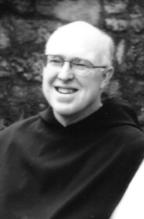The Feast of the Triumph of the Holy Cross, and Fr. Alberic Farbolin’s transfer of Stability
[Scripture Readings: Num 21:4-9; Phil 2:6-11; Jn 3:13-17]
 Small children are known to have vivid imaginations. They are able to live in a fantasy world for long periods of time — in fact until a certain age they cannot distinguish fact from fantasy. They can have imaginary playmates, or friends who keep them company. I know a middle aged woman who told me she explained her bad behavior to herself by having a “good Ann” and a “bad Ann.”
Small children are known to have vivid imaginations. They are able to live in a fantasy world for long periods of time — in fact until a certain age they cannot distinguish fact from fantasy. They can have imaginary playmates, or friends who keep them company. I know a middle aged woman who told me she explained her bad behavior to herself by having a “good Ann” and a “bad Ann.”
We grow out of this fantasy thinking eventually, but we never grow out of the root of this thinking, the divided self. This is something we struggle with all our life. Spiritual writers speak of the true self and the false self. Scripture, as in today’s Gospel, speaks of the flesh and the spirit. St. Paul speaks of our old nature and our new nature—or, as it once was translated, “the old man and the new man.” Once when Fr. Augustine was abbot of Spencer he was presiding at the solemn profession of one of the sisters of Wrentham. He was changing the words to fit the gender. When he came to the prayer about the old and new man he substituted woman—”May the Lord drive out the old woman in you…” Mother Angela, the Abbess, saw him afterwards and accused him of talking about her!
 We all have to live with a divided self but we yearn for a united self. For some reason we believe that to achieve union with ourselves we have to live at a higher plain of existence. We have to deny a lower self—our bodily self, our humiliated self, our suffering self—to live at a higher level where nothing mundane can touch us, above the turmoil and confusion of ordinary life. There are many teachers to lead us on the journey upwards. But St. Paul calls this teaching the wisdom of the world. Opposed to this is the wisdom of the Cross. The mysterious hymn in Paul’s letter to the Philippians we heard this morning explains it like this. “[Jesus] emptied himself, taking the form of a slave, becoming as human beings are, and being in every way like a human being, he was humbler yet, even to accepting death, death on a cross,” As Christians we embrace this path of descent into the suffering of life so that the pattern of the cross may be the pattern of our life for the sake of the glory it will bring.
We all have to live with a divided self but we yearn for a united self. For some reason we believe that to achieve union with ourselves we have to live at a higher plain of existence. We have to deny a lower self—our bodily self, our humiliated self, our suffering self—to live at a higher level where nothing mundane can touch us, above the turmoil and confusion of ordinary life. There are many teachers to lead us on the journey upwards. But St. Paul calls this teaching the wisdom of the world. Opposed to this is the wisdom of the Cross. The mysterious hymn in Paul’s letter to the Philippians we heard this morning explains it like this. “[Jesus] emptied himself, taking the form of a slave, becoming as human beings are, and being in every way like a human being, he was humbler yet, even to accepting death, death on a cross,” As Christians we embrace this path of descent into the suffering of life so that the pattern of the cross may be the pattern of our life for the sake of the glory it will bring.

Today we have the example of one who professes his faith in this journey of the Cross. Fr. Alberic is transferring his vow of stability to New Melleray. It is a nuance. The essence of his life is not changed. He is a monk—the word itself means one, whole, single, undivided. He is on the journey to wholeness, to union.
St. Benedict teaches us how to walk this journey in what he calls the steps of humility. We, like Jesus, descend in order to ascend. The steps are twelve ways to put on the mind of Christ. In this journey nothing is left behind, nothing is condemned that is truly human. God so love this world that he sent his only Son to save the world, not to condemn it.
 The world is everything in nature—above all our human nature. Jesus became human to save all things. Sometimes when we are doing something, putting a lot of effort into it with little results to show for it, we say, “Let it go, it’s not worth saving.” Nothing should be lost—all will be redeemed through the cross of Christ.
The world is everything in nature—above all our human nature. Jesus became human to save all things. Sometimes when we are doing something, putting a lot of effort into it with little results to show for it, we say, “Let it go, it’s not worth saving.” Nothing should be lost—all will be redeemed through the cross of Christ.
This morning we will witness a man recommitting himself to following Jesus in the monastic way of life. As we participate in this ceremony I suggest we all renew our own commitment to Christ in whatever way of life we have chosen.
